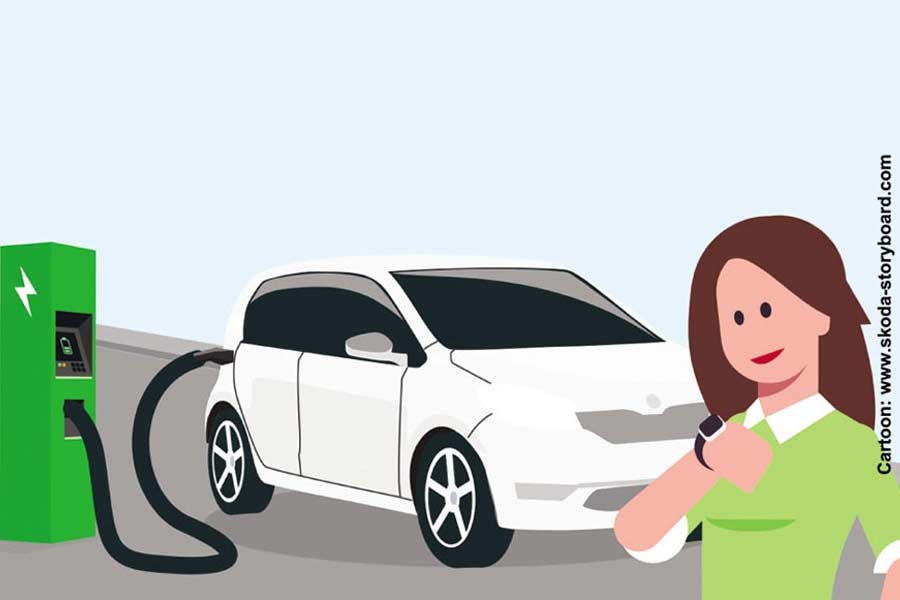Electric mobility in Bangladesh: prospects and possibilities

Published :
Updated :

The global automobile industry is presently undergoing a paradigm shift and switching to a less energy intensive/clean energy options. Transport sector is the second largest contributor to the global Greenhouse Gas (GHG) emissions that contributes 23 per cent of the total man-made CO2 emissions worldwide. It is a widespread agreement that we need to reduce CO2 emissions at least 50 per cent from the transport sector by 2050.
According to Bangladesh's Updated Nationally Determined Contributions (NDC), transport sector will account for 8.86 per cent of the country's total GHG emissions in 2030 under the business-as-usual scenario. It is the third largest sub-sector under the country's energy sector emissions. It is time that Bangladesh thinks of aligning its focus towards the transition to electric mobility.
Electric mobility is globally on the rise and according to the IEA's Global EV Outlook 2021, more than 10 million electric cars and 200 million electric two/three-wheelers are on the road as of December 2020. It is estimated that in the maximal scenario the global EV stock will reach 230 million vehicles and 395 million electric two/three-wheelers in 2030.
In Bangladesh the most prevalent e-mobility solution are the electric two/three wheelers. Although the actual stock take of these "Easy Bikes" are yet to be determined, it is estimated that 1.24 million of these vehicles are on the road which are facilitating transportation of approximately 250 million people.
The EV space in Bangladesh is at a very nascent stage. The government is currently formulating policies to promote wide-scale EV deployment. Bangladesh Road Transport Authority (BRTA) is working on a draft policy to expedite the import, domestic manufacturing and registration of EVs. Automobile Industry Development Policy 2021 is in place that talks about 10-year tax holiday, financial incentives, interest waiver on loans for local manufacturing and assembly of EVs. Several large corporates have announced their plan to establish local EV manufacturing plants.
Bangladesh Auto Industries Limited (BAIL) is setting up the country's first ever electric car plant in Mirsarai Economic Zone. They plan to manufacture all sorts of vehicles starting from two/three wheelers, sedan, hatchback and subsequently SUVs and pickup trucks. Nitol Motors is also setting up an EV assembly plant with the brand name "Suvare". They will assemble sedans that will be able to cover 200 kilometers with just half an hour of charging.
The government plans to introduce EVs in the public transportation system as well. Bangladesh Road Transport Corporation (BRTC) has already taken the initiative to introduce 50 electric buses that will run in long routes like Dhaka-Chottogram. In the updated NDC, Bangladesh committed to establish charging station network and introduce electric buses in major cities.
There is also increased interest among the businesses to integrate sustainable transport solutions into their business operations. Ricardo-AEA Limited, UK and Infrastructure Development Company Limited (IDCOL), Bangladesh has conducted a demand and needs assessment survey among the Micro, Small and Medium-size Enterprises (MSMEs) in Bangladesh. 30 per cent of the responding companies own at least one EV and 56 per cent of the companies expressed their intent to develop an in-house fleet of EV in near future.
For large-scale adoption of EVs, Bangladesh needs to develop the EV charging infrastructure. Presently, there are only 14 EV charging stations that are powered through solar with a total capacity of 282 kW. The existing EVs are managed mostly by using residential arrangements of charging. There is potential to introduce EV charging points in the existing gasoline and CNG stations.
Significant fiscal incentives are required to spur initial uptake of EVs in Bangladesh. Purchase subsidies and registration tax rebates might help reduce the price gap with conventional vehicles.
To address the financing barriers, in line with India's experience, EV financing can be made a priority sector lending which will incentivise banks to increase lending towards this sector. The government in coordination with multilaterals can develop risk sharing mechanisms to cover possible losses associated with EV financing due to their unclear resale value. A developed and formal secondary market can also improve the resale value of EVs and improve their bankability.
Ashraf Hossain Bhuiyan is AVP at Infrastructure Development Company Limited.


 For all latest news, follow The Financial Express Google News channel.
For all latest news, follow The Financial Express Google News channel.